I had the same problem with a project I'm working on and I solved it by following the advice on this page:
http://www.newtonsoft.com/json/help/html/Performance.htm
Specifically, they recommend manually serializing your objects when performance is critical:
public static string ToJson(this Person p)
{
StringWriter sw = new StringWriter();
JsonTextWriter writer = new JsonTextWriter(sw);
// {
writer.WriteStartObject();
// "name" : "Jerry"
writer.WritePropertyName("name");
writer.WriteValue(p.Name);
// "likes": ["Comedy", "Superman"]
writer.WritePropertyName("likes");
writer.WriteStartArray();
foreach (string like in p.Likes)
{
writer.WriteValue(like);
}
writer.WriteEndArray();
// }
writer.WriteEndObject();
return sw.ToString();
}
My example in VB looks like this:
Public Function SerializeWords(ByRef oWords As List(Of Word))
Dim sb As New StringBuilder
Dim sw As New IO.StringWriter(sb)
Using oWriter As Newtonsoft.Json.JsonWriter = New Newtonsoft.Json.JsonTextWriter(sw)
With oWriter
.WriteStartArray()
For Each oWord As Word In oWords
.WriteStartObject()
.WritePropertyName("ID")
.WriteValue(oWord.ID)
.WritePropertyName("Phonics")
.WriteValue(oWord.Phonics)
.WritePropertyName("Word_")
.WriteValue(oWord.Word_)
.WritePropertyName("WordLength")
.WriteValue(oWord.WordLength)
.WriteEndObject()
Next
.WriteEndArray()
End With
End Using
Return sb.ToString
End Function
Notice how it's strongly typed. I believe when you use
Newtonsoft.Json.JsonConvert.SerializeObject()
it's using reflection to get the job done (which can really add up when you have many objects with many properties).
Anyways... once I wrote my own serializer, my time serializing a list of 250 words went from 28 seconds using JsonConvert.SerializeObject() method to 31 milliseconds using my own function.
